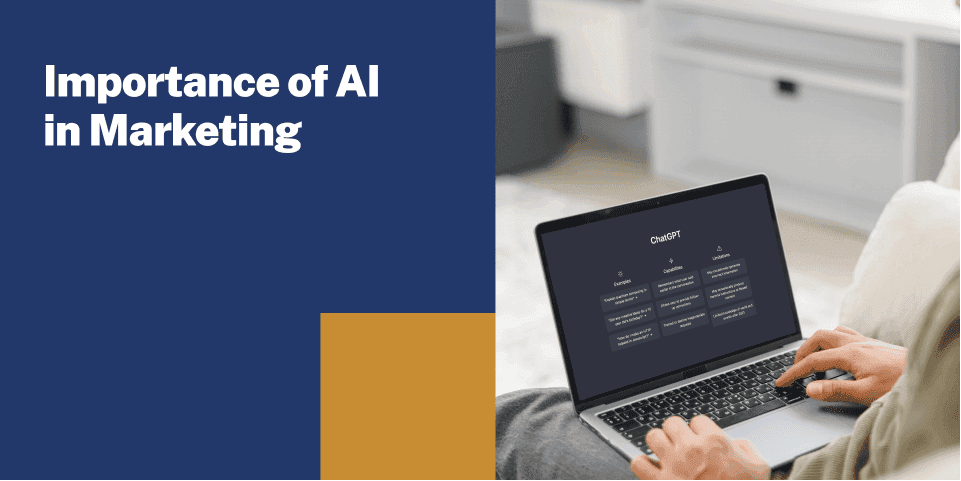5800 students unlocked their dream jobs with UG/PG programs in top colleges. Apply Now!
In today's fast-paced business landscape, where innovation and technology converge, the mastery of marketing strategies has taken centre stage. Amidst this dynamic environment, the symbiosis between artificial intelligence (AI) and marketing has emerged as a game-changer. As businesses strive to stay ahead of the curve and remain competitive, one key element has proven to be a potent catalyst for success - the MBA degree.
In this blog, we will learn how AI Marketing has revolutionised traditional marketing and how this has breathed new life into business across industries.
What is AI Marketing?
Artificial intelligence marketing, or AI marketing, is a strategic field that blends the power of AI with traditional marketing methods. Simply put, AI marketing uses machine learning and complex algorithms to analyse massive volumes of data, spot trends, and come to fact-based conclusions. AI enables marketers to get deeper insights into consumer behaviour, personalise customer experiences, and optimise campaigns with unmatched precision by automating and streamlining activities.
As future marketers, it's crucial to embrace AI as an enabler rather than a replacement for human creativity. By understanding AI Marketing's capabilities, students can capitalise on this technology to craft data-driven, customer-centric campaigns that deliver profitable results.
Role of AI in Marketing
In today's hyper-connected digital era, customers are inundated with an overwhelming amount of information. AI plays an important role in cutting through the noise and delivering targeted, relevant content to individual consumers.
- Understand Customer Behaviour: AI-powered tools analyse customer data to understand preferences, habits, and purchase patterns, allowing businesses to tailor offerings that resonate with their audience.
- Personalise Experiences: AI enables personalised recommendations and content, ensuring that each customer receives a customised experience that fosters loyalty and enhances brand engagement.
- Automate Campaigns: Mundane tasks like email marketing, social media posting, and data analysis can be automated, freeing up marketers' time to focus on creative and strategic aspects.
- Predictive Analytics: By analysing historical data, AI can predict future trends, anticipate customer needs, and optimize marketing strategies for improved ROI.
Importance of AI in Marketing
AI holds immense importance in the field of marketing, revolutionising how businesses understand and interact with their customers. Here are some key reasons why AI is crucial for modern marketing:
- Enhanced Personalisation: AI allows hyper-personalisation by analysing a large number of customer data. It allows marketers to deliver personalised content that results in improved customer engagement and loyalty.
- Data-Driven Decision Making: AI can process and analyse large datasets in real time, providing valuable insights into customer behaviour, market trends, and campaign performance. Marketers can make data-driven decisions for better results and higher return on investment (ROI).
- Improved Customer Experience: With AI-powered chatbots and virtual assistants, businesses can provide 24/7 customer support and instant responses to queries. AI-driven interactions enhance the customer experience by offering personalised assistance.
- Marketing Automation: AI automates repetitive and time-consuming tasks, such as email marketing, social media posting, and lead nurturing. Automation streamlines processes improves efficiency, and allows marketers to focus on strategic initiatives.
- Efficient Lead Generation and Management: AI can analyse customer data to identify high-quality leads and prioritise them based on their likelihood to convert. This ensures that marketers invest their time and resources in the most promising opportunities.
- Cost Efficiency: While there may be an initial investment in AI implementation, its long-term benefits often outweigh the costs. AI automation reduces human labour and errors, leading to cost savings and increased operational efficiency.
How to use AI in Marketing?
Using AI in marketing can significantly enhance your marketing strategies. Here are some practical ways to use AI in marketing:
- Utilise AI to analyse customer data and create personalised experiences for your audience.
- Employ AI-driven predictive analytics to forecast customer behaviour and market trends.
- Automate repetitive tasks like email marketing, social media scheduling, and lead nurturing using AI-powered tools.
- Integrate AI-driven chatbots on the website or social media platforms to provide instant customer support and engage with users in real time.
- Utilise AI tools to monitor and analyse social media conversations and mentions about your brand.
- Use AI-powered tools to analyse competitors' marketing strategies, digital presence, and performance.
Disadvantages of AI Marketing
While AI marketing offers numerous advantages and opportunities for businesses, it also comes with its fair share of disadvantages and challenges. Here are some of the key disadvantages of AI marketing:
- Cost and Complexity: Implementing AI marketing solutions can be costly, particularly for small and medium-sized businesses. Additionally, the complexity of AI systems may require specialised expertise, leading to higher maintenance costs.
- Lack of human touch: AI marketing, with its focus on automation and personalisation, may lead to a reduced human touch in customer interactions. Some customers may prefer human interaction, and an overreliance on AI could result in a disconnect between the brand and its audience.
- Bias and Fairness Issue: AI algorithms are only as good as the data they are trained on. This can lead to unfair targeting or discriminatory practices, causing reputational harm and legal challenges.
- Misinterpretation of Data: AI marketing systems rely on accurate data for effective decision-making. However, if the data used for training or analysis is flawed or misinterpreted, it can lead to inaccurate predictions and flawed marketing strategies.
- Limitations of Creativity: While AI can analyse data and make data-driven decisions, it lacks human creativity and intuition. Marketing often involves creative thinking and emotional connections, which AI may struggle to replicate fully.
Conclusion
The MBA degree serves as a guiding compass for aspiring marketers, allowing them to navigate the complex landscape of AI marketing with a sharp focus on business objectives and customer-centric strategies. Armed with the knowledge of AI's capabilities and limitations, MBA-educated marketers can harness its power to craft data-driven campaigns, optimise resources, and gain a competitive edge in their respective industries.
You can apply for the MBA program at Sunstone if you plan to pursue an MBA postgraduate degree. You receive a lot of advantages that will help you develop your career. 70+ training and development sessions by top recruiters and industry experts, learn from expert guest faculty who are ex-IIMs and IITs, build a professional portfolio and many more benefits you get if you apply with Sunstone.
FAQs - Importance of AI Marketing
What is the difference between digital and traditional marketing?
While both digital marketing and traditional marketing aim to promote products and services, their methods, reach, costs, and level of interactivity differ significantly.
What is the salary of an MBA in Digital Marketing?
The average salary after MBA in digital marketing is ₹3-4 LPA
Can I pursue an MBA degree without an entrance exam?
Yes, few universities take admissions for MBA programs based on a student's performance in his/her bachelor’s degree.
Is there any age limit for MBA programs?
No, there are no age restrictions for students to pursue MBA programs.
Can I pursue MBA programs from colleges powered by Sunstone?
Yes, you can pursue MBA courses from colleges powered by Sunstone. Some of the top colleges are:
- Atlas Ideal International College
- Ajeenkya DY Patil University
- GD Goenka University
- Bangalore Institute of Management Studies
- SAGE University
HELP
Take the first step towards your dream job.
ABOUT THE AUTHOR

